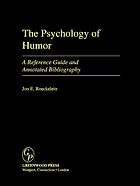Table Of ContentThe Psychology of
Humor
The Psychology of
Humor
A Reference Guide and
Annotated Bibliography
Jon E. Roeckelein
GREENWOOD PRESS
Westport, Connecticut • London
Library of Congress Cataloging-in-Publication Data
Roeckelein, Jon E.
Thepsychologyofhumor : areferenceguideandannotatedbibliography / JonE.Roeckelein.
p. cm.
Includes bibliographical references (p. ) and indexes.
ISBN 0–313–31577–9 (alk. paper)
1. Wit and humor—Psychological aspects. 2. Wit and humor—Psychological
aspects—Bibliography. I. Title.
PN6144.P5R64 2002
152.4′3—dc21 2001040554
British Library Cataloguing in Publication Data is available.
Copyright © 2002 by Jon E. Roeckelein
All rights reserved. No portion of this book may be
reproduced, by any process or technique, without the
express written consent of the publisher.
Library of Congress Catalog Card Number: 2001040554
ISBN: 0–313–31577–9
First published in 2002
Greenwood Press, 88 Post Road West, Westport, CT 06881
An imprint of Greenwood Publishing Group, Inc.
www.greenwood.com
Printed in the United States of America
The paper used in this book complies with the
Permanent Paper Standard issued by the National
Information Standards Organization (Z39.48–1984).
10 9 8 7 6 5 4 3 2 1
Copyright Acknowledgment
Theauthorandpublishergratefullyacknowledgepermissiontoquoteseveralworddefinitions
fromWebster’sThirdNewInternational®Dictionary,Unabridged©1993byMerriam-Webster,
Incorporated.
In memory of Don C. Ettore.
Tomyinlaws—MargieHarrisandDonandPamEttore—whohaveal-
waysshownmegreathospitality,honor,andadeeperaspectofhumor:
that of joy.
Tothe“goodolddays”ofthelate1960s,andtomycolleaguesandthe
crewatHumanResourcesResearchOffice(HumRRO),Division4(Fort
Benning, Georgia), especially “Jake” Jacobs, Joe Olmstead, and Doug
Holmeswhoeachgenerouslyprovidedmewithhumor,personalfriend-
ship,andintellectualstimulation;andtothelateJamesScoresby—afel-
lowteacherwhoknewthetruemeaningandvalueofhumorandlaughter.
Contents
Preface ix
Introduction 1
1. Terminological Aspects and Domains of Humor 9
Definitions of the Concept of Humor 9
Humor versus Wit 24
Humor and Laughter 33
Humor and Comedy 52
Humor as Satire/Irony/Sarcasm/Farce/Parody 58
Humor as Riddles/Puns/Jokes 63
Humor in Caricature/Cartoons/Comic Strips/Slapstick 69
2. Origins and Evolution of Humor 87
Ancient/Primitive Humor 87
Humor and the Early Philosophical Theories 94
Biblical and Jewish Humor 99
3. Modern Theoretical Aspects of Humor 119
Nonpsychological Theories of Humor 119
Psychological Theories of Humor 142
Summary: A Concise Dictionary of Humor Theories 191
4. Differential and Functional Aspects of Humor 227
Differences in Humor Appreciation 227
Functions of Humor 267
viii CONTENTS
5. Methodological and Futuristic Aspects of Humor 367
Scientific Methodology and Humor Research 367
Measurement of Humor 397
Future Faces of Humor 419
6. Annotated Bibliography of Humor Studies in Psychology
(1970–2001) 443
Aggression and Humor 444
Application of Humor 449
Bibliographies and Literature Reviews of Humor 463
Cognition and Humor 468
Humor as Comedy/Jokes/Puns/Riddles/Satire/Irony 477
Humor as Laughter and Wit 481
Individual and Group Differences in Humor 484
Methodology and Measurement of Humor 505
Nature of the Humorous Stimulus 508
Social Aspects of Humor 518
Name Index 531
Subject Index 567
Preface
Recently,inJanuary2001,Iconductedacomputersearchofthekeywordhu-
morusingtheMELVYLCatalog(CaliforniaDigitalLibrary,CDL)database,
andfoundatotalofover14,015studiesthatcutacrossmanydifferentacademic
disciplinesrangingfromanthropologytothehealthsciencestozoology/ethol-
ogy.[Note:ThedatabaseWorldCatshowsover75,670publisheditemsworld-
wide—cutting across many languages and disciplines—for the keyword
humor!]Also,ataboutthesametime,whenIsearchedhumoronthemoredis-
cipline-specific database PsycINFO, I discovered that there are over 3,140
studiesonhumorinthepsychologicalliteraturethathavebeenpublishedbe-
tween 1887 and 2001.
Thelargenumberofhumorstudiespublishedinthefieldofpsychology—as
comparedproportionatelytootherdisciplineareas—indicatesthatthetopicof
humorisrepresentedstronglyinpsychology(aswellasinafewotherdisci-
plineareas,suchasthefieldsofliteratureandhistory,whichincludenotonly
thewealthofthewritingsoftheworld’shumoriststhemselves,butalsoofthe
numerouscritiques,commentaries,theses,anddissertationswrittenabouthu-
morists and their works). According to the figures here, when contrasting
MELVYLwithPsycINFO,psychologycapturesalmostone-fourthofthetotal
number of studies published on humor across all disciplines.
The finding that the field of psychology contains such a large number of
studiesonhumorrequiresthatareview,reference,andresourcebook—suchas
thepresentwork—setupcriteriaandboundariesconcerningselectionofthe
typeofmaterialtobecovered.Accordingly,thefollowingparametersserveas
the basis for selection of material in this book:
x PREFACE
1. Thetopicofhumorascomparedandcontrastedwithanumberofhumor-related
termssuchaswit,laughter,comedy,satire/irony,puns,jokes,andcartoons,among
others.
2. Thetopicofhumorinahistoricalcontext,includingtheoriginsandevolutionofhu-
mor.
3. The topic of humor from theoretical, functional, and differential perspectives.
4. The topic of humor as used in experimental/empirical studies involving various
methodologies and measurements of humor.
5. The topic of humor as projected into future research settings and contexts.
6. Thetopicofhumorinthemodernpsychologicalliteraturefrom1970through2001,
including, among others, the rubrics of humor, wit, laughter, comedy, sat-
ire/irony/sarcasm/farce/parody,riddles/puns/jokes,andcaricature/cartoons/comic
strips/slapstickthatcompriseacurrentannotatedbibliographyofhumorstudiesin
psychology.
The goal of this book is to provide a one-volume resource and reference
bookforthepsychologyofhumorthatcoverstheterminologicaldomainsof
humor, the origins and evolution of humor, the present and projected future
methodologicalandtheoreticalconcernsofpsychologistsregardingthestudy
ofhumor,andascientific,experimental,andempiricalaccountofthetopicof
humor as reflected in the recent psychological literature.
Inmorespecificterms,theplanandoutlineofthisbookistocoverthefol-
lowingmaterial:thevariousterminologicalaspectsanddomainsofhumoras
distinguishedfromhumor-relatedtermssuchaswit,laughter,comedy,satire,
irony,sarcasm,farce,parody,riddles,puns,jokes,caricature,cartoons,comic
strips,andslapstick(Chapter1);humorasconceivedbyancient/primitivehu-
mans,earlyphilosophers,andJewishandbiblicalwriters(Chapter2);thevari-
ous modern theoretical aspects of humor, including prominent
nonpsychologicalandpsychologicaltheoriesofhumor(Chapter3);thediffer-
entialandfunctionalaspectsofhumor,includingpersonality,gender,individ-
ual, cross-generational, cross-cultural, and ethnic differences, and the
functions of humor including humor as a coping mechanism, as a
psychotherapeuticaid,asanadjunctintheclassroomandtheworkplace,and
thesocialinfluencesofhumor(Chapter4);themethodological,measurement,
andfuturisticaspectsofhumor(Chapter5);andhumorasindicatedinacurrent
(1970–2001)annotatedbibliographyofhumorstudiesinpsychology(Chapter
6).Also,thisbookcontainsaNameIndexandSubjectIndextohelpintherapid
location of particular persons and specific subjects and topics of interest.

